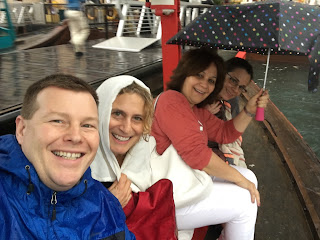Unexpectedly, about 10 minutes into my lesson, the distinctive tone of an incoming Skype call filled the room. My students know this sound pretty well by now.
"Who are we talking to today?"
"Are we supposed to be having a Skype call?"
"Who's calling us?"
 In a few seconds I had to make a decision. Should I answer the call or continue on with my solid lesson plan? I saw that a teacher in Nepal, Pradeep Sapkota, whom I had been playing the Skype equivalent of phone tag with over the past couple of weeks was on the other end. He and I have been looking for ways to connect our students. His students had their school destroyed by last year's earthquake and are learning English. I wanted my 5th grade students who were learning about plate tectonics to connect with them to learn about the earthquake.
In a few seconds I had to make a decision. Should I answer the call or continue on with my solid lesson plan? I saw that a teacher in Nepal, Pradeep Sapkota, whom I had been playing the Skype equivalent of phone tag with over the past couple of weeks was on the other end. He and I have been looking for ways to connect our students. His students had their school destroyed by last year's earthquake and are learning English. I wanted my 5th grade students who were learning about plate tectonics to connect with them to learn about the earthquake.I knew that it was too late for Pradeep's students to be on the call. My 4th graders hadn't learned much about geology. They have the state's high-stakes standardized science test coming up in a few weeks. They were excited to look at the data from NASA. There were plenty of reasons to ignore this call and move along with my lesson.
But I didn't. I answered the call. Sometimes it's moments of serendipity that make the best learning experiences. If we never take the chance to allow them to happen, our students are robbed of opportunity.
My kids learned from Pradeep about the earthquake. They learned that the Nepalese don't eat beef, that students are learning outside because their school is being rebuilt, that Mount Everest is in Nepal, and that the capital of Nepal is Kathmandu. They got a little taste of a different part of the world, which by itself is a wonderful experience and absolutely worth the time we took out of our lesson. When we travel and experience different cultures with an open mind, beit physically or virtually, we get the opportunity to see what parts of those other cultures we can incorporate into ourselves to make us a better person. I want my students to have as many of those experiences as possible.
And then, just as we were about to end the call, serendipity happened. One of my students asked, "We've been learning about climate change. Has climate change had an effect on you up in the mountains?"
The impersonal data that we were looking at just became a whole lot more meaningful. Pradeep told us how rising temperatures are causing avalanches in Nepal as snow on the mountains becomes less stable. He told us that many people were affected. He told us that Nepalese people were dying.
After the call we still looked at NASA's data, although we got to see less of it than we would have had I not answered the call. The data my students did analyze was a whole lot more meaningful to them, though. We also had great discussions about the shape of mountains in the Himalayas and how that relates to avalanches, plate tectonics (they'll have a great head start for next year's learning), and Asian geography.
It's the emotional connections to content that make knowledge stick in our students long-term memory. They may not remember in two weeks how many parts per million the carbon dioxide in our atmosphere has risen in the past three decades, but I guarantee they'll be able to tell you ways climate change is affecting humans.
Sometimes, with all the demands placed upon us as teachers, it's easy to forget why we do what we do. It's easy to focus on the content that needs to be covered, the assignment that needs to be completed, or the assessment that is upcoming instead of the inspiration that we have the opportunity to provide our students. The most important things we do in schools can't be quantified easily, and so it's easy to forget their power.
It's the unexpected, and often uncelebrated, moments of awesome that make all the difference for our students. As teachers, sometimes we just need to let them happen.





































































